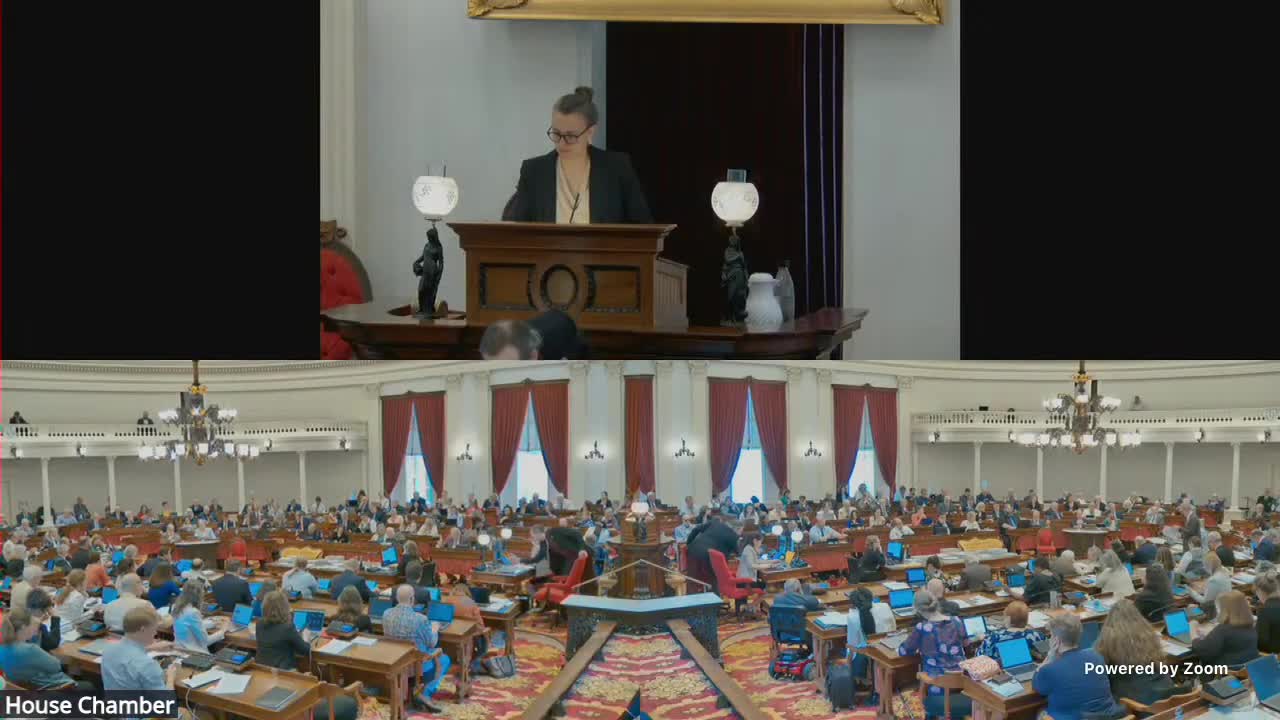Vermont legislators reach compromise on community housing infrastructure program
May 31, 2025 | HOUSE OF REPRESENTATIVES, Committees, Legislative , Vermont
This article was created by AI summarizing key points discussed. AI makes mistakes, so for full details and context, please refer to the video of the full meeting. Please report any errors so we can fix them. Report an error »

In a pivotal session held at the Vermont Legislature, lawmakers gathered to discuss significant changes to the Community and Housing Infrastructure Program (CHIP), aiming to address the state's pressing housing shortage. The atmosphere was charged with anticipation as representatives from both the House and Senate presented a unified front on the proposed amendments.
One of the key highlights of the meeting was the expansion of the Vermont Economic and Planning Services Initiative (VEPSI) board, which now includes three new voting members from the Vermont Housing Finance Agency and the Vermont Housing Conservation Board. Additionally, a non-voting member from the Agency of Commerce and Community Development was added, ensuring diverse perspectives in decision-making processes related to housing applications.
A contentious point of discussion revolved around the inclusion of contiguous parcels in the CHIP program. While Senate members advocated for their inclusion, House representatives pushed back, citing concerns over potential financial impacts on the education fund. Ultimately, a compromise was reached to exclude these parcels from the current proposal, with an agreement to revisit the issue in the following year.
Another significant change was the removal of a proposed sunset clause on the statewide Tax Increment Financing (TIF) program, which had been a topic of heated debate. Lawmakers expressed confidence that this decision would provide stability for future infrastructure projects, with assurances of support from the governor.
The session also saw discussions about the ambitious new cap for tax increment retention, which was raised from $40 million to $200 million. This increase aims to facilitate the construction of approximately 3,750 new housing units annually, a goal that many representatives acknowledged as both necessary and challenging.
As the meeting progressed, members expressed gratitude for the collaborative efforts that led to the conference report, emphasizing the importance of addressing the needs of rural communities. The sentiment was clear: while challenges remain, this legislative step marks a significant advancement in Vermont's ongoing battle against housing shortages.
With a roll call vote anticipated, the atmosphere was one of cautious optimism. Lawmakers recognized that while this compromise may not satisfy every concern, it represents a crucial move towards enhancing housing infrastructure and meeting the needs of Vermonters. As discussions concluded, the focus shifted to the future, with a collective commitment to continue addressing the barriers to housing development in the state.
One of the key highlights of the meeting was the expansion of the Vermont Economic and Planning Services Initiative (VEPSI) board, which now includes three new voting members from the Vermont Housing Finance Agency and the Vermont Housing Conservation Board. Additionally, a non-voting member from the Agency of Commerce and Community Development was added, ensuring diverse perspectives in decision-making processes related to housing applications.
A contentious point of discussion revolved around the inclusion of contiguous parcels in the CHIP program. While Senate members advocated for their inclusion, House representatives pushed back, citing concerns over potential financial impacts on the education fund. Ultimately, a compromise was reached to exclude these parcels from the current proposal, with an agreement to revisit the issue in the following year.
Another significant change was the removal of a proposed sunset clause on the statewide Tax Increment Financing (TIF) program, which had been a topic of heated debate. Lawmakers expressed confidence that this decision would provide stability for future infrastructure projects, with assurances of support from the governor.
The session also saw discussions about the ambitious new cap for tax increment retention, which was raised from $40 million to $200 million. This increase aims to facilitate the construction of approximately 3,750 new housing units annually, a goal that many representatives acknowledged as both necessary and challenging.
As the meeting progressed, members expressed gratitude for the collaborative efforts that led to the conference report, emphasizing the importance of addressing the needs of rural communities. The sentiment was clear: while challenges remain, this legislative step marks a significant advancement in Vermont's ongoing battle against housing shortages.
With a roll call vote anticipated, the atmosphere was one of cautious optimism. Lawmakers recognized that while this compromise may not satisfy every concern, it represents a crucial move towards enhancing housing infrastructure and meeting the needs of Vermonters. As discussions concluded, the focus shifted to the future, with a collective commitment to continue addressing the barriers to housing development in the state.
View full meeting
This article is based on a recent meeting—watch the full video and explore the complete transcript for deeper insights into the discussion.
View full meeting